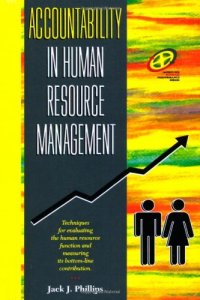
Ebook: Accountability in Human Resource Management
- Genre: Business // Management
- Tags: Менеджмент, Управление персоналом
- Series: Improving human performance series
- Year: 1996
- Publisher: Gulf Publ
- City: Houston, Tex
- Language: English
- pdf
Within this context, he divides his book into four parts as follows:
Part I- presents a general framework for evaluating the HR function (Chapters 1-2)
Part II- presents the issues involved in developing a results-based approach to HR (Chapters 3-4)
Part III- focuses on specific ways to measure the contribution of HR (Chapters 5-9)
Part IV- explores data analysis and presentation results.
One of the core concepts of the book, in Chapter 1, he focuses on paradigm shifts from traditional HR approach to a more results-based approach demanded in today's environment, and summarizes these paradigm shifts necessary for a results-based approach as follows:
Traditional Approach:
(1) New programs initiated by request or suggestion of any significant manager or group.
(2) A maltitude of programs in all areas.
(3) Existing programs are rarely, if ever, eliminated or changed.
(4) Count activities, hours of involvement, number of employees involved, etc.
(5) Limited management involvement in the HR process.
(6) HR viewed as cost center.
(7) HR staff unfamiliar with operations issues.
(8) HR staff lack knowledge of finance and business concepts.
Results-Based Approach:
(1) New programs initiated only after a legitimate need is established.
(2) Fewer programs with greater opportunity to make an impact.
(3) Existing programs are regularly reviewed and eliminated when necessary.
(4) Measure the impact of programs on the organization.
(5) Extensive involvement and collaboration with management.
(6) HR is viewed as an investment in employees.
(7) HR staff very knowledgeable about operations issues.
(8) HR staff versed in basic finance and business concepts.
I highly recommend this invaluable study to all HR executives.